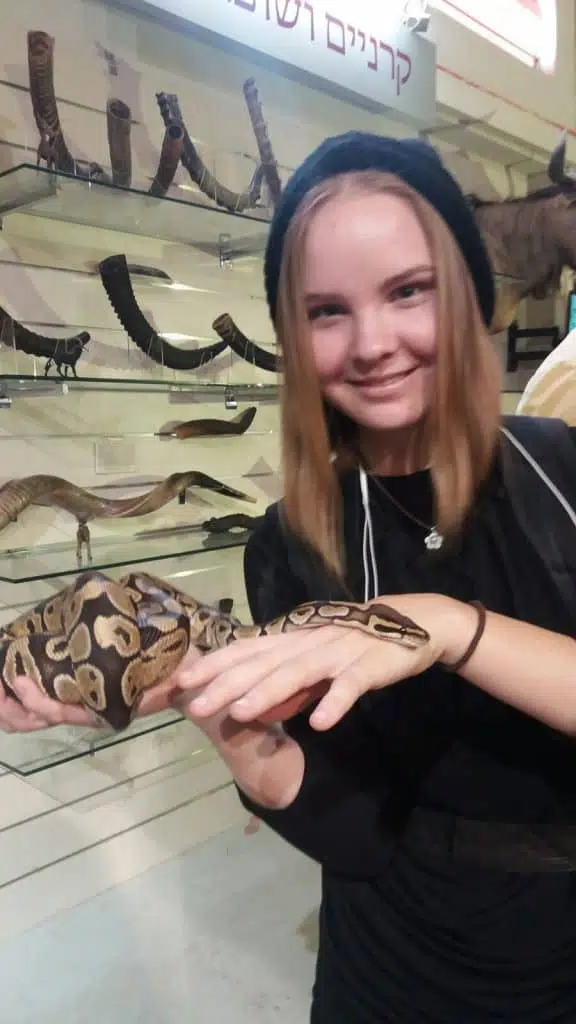Greetings. My name is Vera and I’m currently a student on Aardvark. I’m an Orthodox Jewish girl, who was adopted from Russia by American parents. I graduated from Scheck Hillel in Miami, Florida. Before graduation, my parents and I knew that it was an obligation for me to come back to Israel prior to starting university.
Choosing a gap year program was difficult for me. I didn’t exactly know what I wanted, even if I thought I did. I had a choice between three different programs, two interviews, and had to make one decision. I made the decision to come to Aardvark.
How did I find out about Aardvark Israel Immersion Program? It was the beginning of fourth year of highschool. Our school had seminars for colleges and gap year programs. A recruiter named, Simon, came and introduced the program to us. He told us the basics of the program, the schedule, including extensions such as Selah and the international trips. At the end of the presentation, I left, trying to look for the benefits of the program.
There were many benefits to coming onto the program. For one, I was going gain a lot of responsibility and independence. What came with that was learning how to work with time management, budgeting, and my all-time “favourite” chore, cooking for myself. (I never cooked for myself before entering the program, now I cook for everyone else). I also had internships, which prepared me to take up hands-on experience with something I personally enjoyed. In addition to that, I was juggling with four academic classes that challenged me greatly.
My first internship was an amazing experience. When I lived in Jerusalem for first semester, I had the wonderful opportunity to work in a kindergarten in Katamon. I had thirty-four amazing children. A large portion of children were bilingual, which made it easier to transition between English and Hebrew. I had good relationships with the teachers and parents. I developed meaningful relationships between each child and I learned how different each of them were.
One of my greatest accomplishments at the Gan was being able to do something none of the other morot (teachers) were able to do. I had a special bond with a little girl named, Liron. She was extremely introverted. She was also trilingual and usually stayed silent (It’s understandable for children living in multilingual families to be late in developing speech, since the languages can be confused easily as their mind develops). I gained trust from Liron as the months passed. One day, it was recess for everyone. Liron is climbing on the monkey bar set. I asked her what her favourite drink was in English. Instead of her usual silent smile or nodding, she blessed me. She blessed me with the sound of her voice. The voice that I and many of the other morot were anxiously waiting for her to use. She answered, “Teh,” which meant, “tea,” in Hebrew. I almost bursted in tears of joy. It’s the smallest events that really give me the greatest feeling of worth, just like this one.
One highlight of the program that truly makes a grand entrance were the international trips. There were six trips included: Italy, Ethiopia, Nepal, China, Czech Republic and Spain. I chose to go to China, out of all of the trips. I was aware that the culture there is drastically different from America and Israel. I really wanted to experience something completely different. I spent a week there with quite a few good friends I had created on the program. The culture, food, weather and language were alien to me. The flight there was exhausting, despite that, we didn’t rest the first day. We moved on strong. I went to the Great Wall of China! It was so cold, and the steps were uneven in height, but made it to the third tower. The view was breathtaking.
Another great experience on that trip was going to the Chabad in Beijing and spending Shabbat there. I met many new people. I went to shul and prayed. It was the first time since I come to Israel that I had visited a shul, and that experience reminded me how much I had missed going and hearing the Torah. What fascinated me the most about the congregation was not the fact that they understood Chinese, English and Hebrew, but that they also understood Yiddish. They told me that their children were growing up learning in school Chinese and English, while at home, Hebrew and Yiddish. After davening, we had Shabbat lunch. It felt like home; the food, the Shir HaShirim, and the speeches from the Rabbi, all brought back such nostalgia. I am never going to have an experience like that, especially for Shabbat, ever again.
Today, I’m currently working in Techelet, a wall painting renovation company. I’m attending classes and advancing in Ulpan, much more than in high-school. I also got accepted into one of the top ten schools of art and design in New York, which I’ll be attending in the following year. I’m continuing with my painting and drawing, and have recently joined Selah this week, an experience that I have yet to immerse myself in!


















